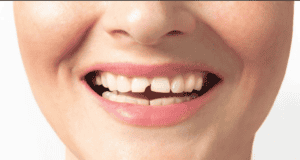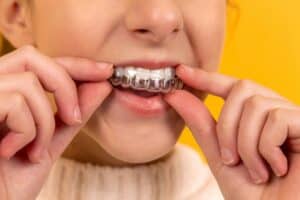Did you know that almost 15 million Americans receive dental injuries and 5 million teeth are lost annually in sports-related injuries?
Cracked teeth, fractured roots, and tooth intrusion are the three most common sports-related dental injuries. The National High School Sports-related Injury Surveillance Study mentioned that 72.5% of dental injuries occurred in athletes without a mouthguard. So, mouthguards or biteguards play a critical role in protecting your teeth during sports.
How do Mouth Guards Work?
Mouthguards are oral devices that cover your teeth and nearby gums. They create a barrier between the teeth and the point of impact. Nightguards help absorb shock in the area around the jaw and reduce damage to the jaw, teeth, or lips. So, whether in a boxing ring or soccer field, a blow to your face or jaw would not knock out your tooth when wearing a mouthguard. Opposed to common perception, wearing a mouthguard is not uncomfortable. You might feel slight discomfort for the first few minutes, but it goes away as the biteguard settles.
Sports that Require Nightguards
While Dr. Sekhon at Sekhon Dental – Dentist Agoura Hills suggest wearing mouthguards for all contact sports, they are inevitable in the following:
- Boxing
- Football
- Rugby
- AFL
- Hockey
- Wrestling
- Volleyball
Which Mouthguards are the Best?
Stock (premade), boil and bite, and custom biteguards are the most common choices of mouthguards. All mouthguards are suitable for different needs, but custom nightguards are the best as they are designed to take the exact shape of your teeth; it eliminates the slightest chance of discomfort and offers you better protection. At Sekhon Dental – Dentist Agoura Hills, we take impressions of your teeth with our 3D intraoral scanner. We analyze the scan, design and then print your custom nightguard using our 3D printer in-house.
When Should You Change Your Mouthguard?
Though mouthguards are designed to take impact and protect your teeth, they lose their protective ability over time. It is best to consult Sekhon Dental—Dentist Agoura Hills every six to twelve months to see if you need to change the nightguards.
The following signs also indicate that you need to change the mouthguard:
- Discoloration (due to lack of proper care – make sure to rinse your mouthguard before and after use))
- Lost its original shape due to excessive impact
- Unpleasant smell or taste
- Recent dental procedures leading to changes in your tooth shape
Call and schedule your appointment to discuss your personal options.


